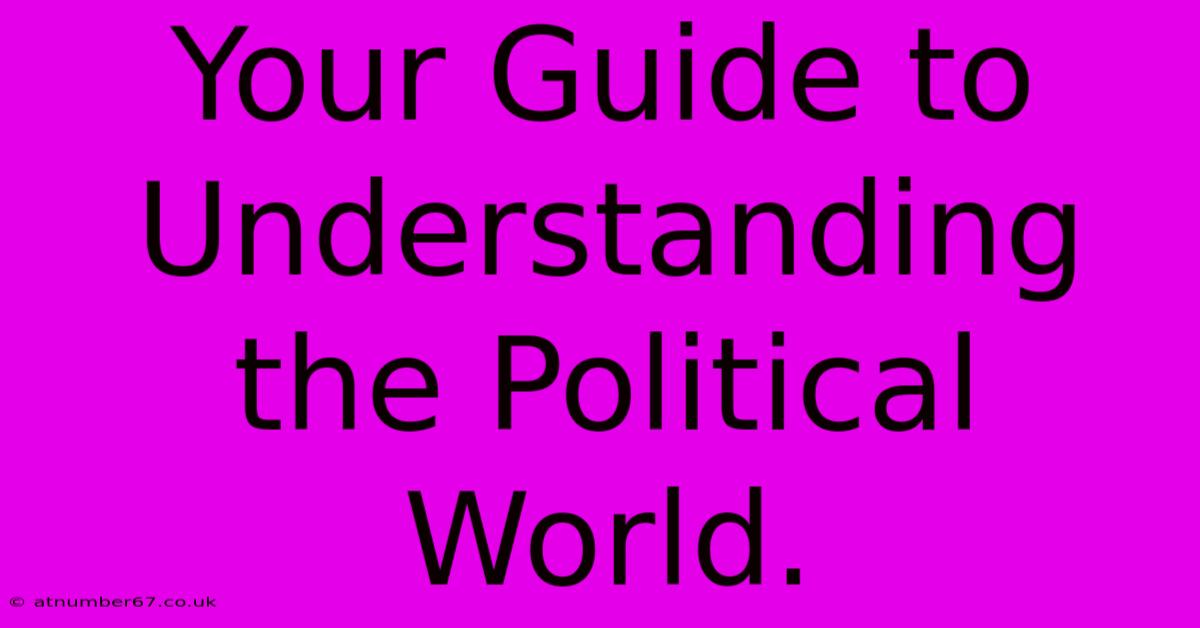Your Guide To Understanding The Political World.

Table of Contents
Your Guide to Understanding the Political World
The political world can seem like a confusing maze of jargon, conflicting ideologies, and power plays. But understanding the basics is crucial for engaging in informed discussions, making responsible choices, and shaping a better future. This guide provides a foundational understanding of key political concepts, systems, and processes.
Understanding Political Ideologies
At the heart of politics lie differing ideologies – sets of beliefs about how society should be governed. While many variations exist, some core ideologies shape the political landscape:
1. Liberalism:
- Emphasis: Individual rights, freedoms, and limited government intervention. Liberals generally favor a market economy with regulations to protect consumers and workers, and advocate for social programs to address inequality.
- Key Principles: Individual liberty, equality before the law, free markets (with regulation), and representative democracy.
- Examples: Many Western democracies incorporate liberal principles, although the specific application varies considerably.
2. Conservatism:
- Emphasis: Traditional values, social order, and limited government intervention (though often with exceptions). Conservatives typically advocate for lower taxes, reduced government spending, and a strong national defense.
- Key Principles: Emphasis on tradition, individual responsibility, free markets, and a strong national defense.
- Examples: The Republican Party in the United States and the Conservative Party in the United Kingdom are examples of conservative political parties.
3. Socialism:
- Emphasis: Social ownership or control of the means of production and distribution of goods and services. Socialists typically advocate for greater economic equality, social welfare programs, and worker rights.
- Key Principles: Economic equality, social justice, worker empowerment, and collective ownership.
- Examples: While pure socialist states are rare, many countries incorporate socialist policies into their mixed economies.
4. Anarchism:
- Emphasis: Abolition of all forms of government and hierarchical power structures. Anarchists believe in individual liberty and self-governance.
- Key Principles: Individual liberty, self-governance, and the absence of state authority.
- Examples: Various anarchist movements and philosophies exist, often with differing approaches and strategies.
Key Political Systems
Different countries employ various political systems to organize their governments and distribute power. Understanding these systems is crucial to comprehending global politics:
1. Democracy:
- Definition: A system of government where supreme power is vested in the people and exercised by them directly or indirectly through a system of representation, typically involving periodic free and fair elections.
- Types: Direct democracy (citizens directly participate in decision-making) and representative democracy (citizens elect representatives to make decisions on their behalf).
2. Authoritarianism:
- Definition: A system of government characterized by strong central power and limited political freedoms. Authoritarian regimes often suppress dissent and restrict civil liberties.
- Examples: Dictatorships, absolute monarchies, and one-party states.
3. Totalitarianism:
- Definition: An extreme form of authoritarianism characterized by total control over all aspects of public and private life. Totalitarian regimes often employ propaganda, surveillance, and violence to maintain power.
- Examples: Historical examples include Nazi Germany and the Soviet Union under Stalin.
Navigating the Political Landscape
Understanding the political world requires more than just knowing the ideologies and systems. It also involves:
- Staying Informed: Consume news from diverse and reputable sources to get a well-rounded perspective. Be critical of information and identify potential biases.
- Engaging in Civil Discourse: Participate in respectful discussions with people holding different views. Focus on understanding their perspectives, even if you don't agree.
- Understanding Political Processes: Learn about how laws are made, how elections work, and how different branches of government interact.
- Active Participation: Vote in elections, get involved in campaigns, and contact your elected officials to express your opinions and concerns.
In Conclusion:
The political world is complex, but understanding its fundamental elements empowers you to engage meaningfully with the issues that shape your life and the world around you. By exploring these ideologies, systems, and processes, you can become a more informed and engaged citizen. Remember that continuous learning and critical thinking are essential for navigating this constantly evolving landscape.

Thank you for visiting our website wich cover about Your Guide To Understanding The Political World.. We hope the information provided has been useful to you. Feel free to contact us if you have any questions or need further assistance. See you next time and dont miss to bookmark.
Featured Posts
-
Angela Torres Family A Legacy Of Talent
Apr 04, 2025
-
Xqcs Net Worth A Surprisingly Honest Look
Apr 04, 2025
-
High Blood Pressure In Older Adults Prevention And Treatment
Apr 04, 2025
-
Daughter Of Zion Claim Your Birthright
Apr 04, 2025
-
How Carl Lundstroem Built His Multi Million Dollar Fortune
Apr 04, 2025
